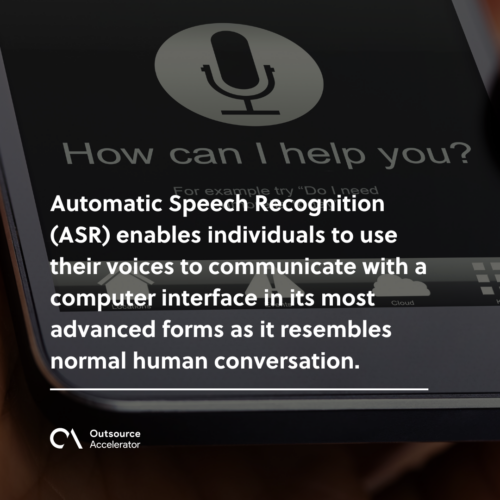Automatic speech recognition
Definition
What is automatic speech recognition?
Automatic Speech Recognition (ASR) enables individuals to use their voices to communicate with a computer interface in its most advanced forms as it resembles normal human conversation.
ASR can be effective in determining why a client is calling and routing the call to the appropriate agent.
Further, it is a developing technology that is being improved at a high pace since the growing adoption of virtual assistants like Amazon’s Alexa is driving consumer’s expectations in AI.
What are the variants of automatic speech recognition?
Natural language processing and directed dialogue conversations are the two primary types of automatic speech recognition software variations.
Directed dialogue conversations
Directed dialogue conversations are a simplified form of automatic speech recognition at work, It is frequently practiced in automated telephone banking and other customer service interfaces.
It consists of machine interfaces that guide users to answer with a single word from a restricted selection of options, creating their response to the narrowly specified request.
Natural language processing
Natural language processing is the advanced variation of automatic speech recognition. This variation attempts to imitate actual conversation by allowing users to utilize an open-ended chat-style, instead of using a highly limited selection of terms.
Natural language processing allows real conversation between humans and intelligent machines. However, it still has a long way to go before reaching its high point of development.

What are the use cases for automatic speech recognition?
The ASR system has various applications. It has transcended the boundaries of computer science laboratories and is now a part of modern life.
Here are some examples of where you can find the uses of automatic speech recognition, such as:
Voice assistants
The integration of voice assistants, which many of us use daily, is the most common automatic speech recognition use case.
The ability to utilize voice commands to accomplish tasks such as activating mobile applications, sending text messages or web browsing provides convenience to the consumers.
Transcription services
One of the most widely used applications of automatic speech recognition is for basic speech transcription. Speech-to-text services provide convenience in various settings and create the foundation for enhanced audio and video accessibility.
Podcast transcripts provide listeners with a text-based reference, allowing search engines to scan and classify specific episodes. It also enables the real-time transcription of live video, allowing a larger audience to access the material.
Call centers
Interactive voice response (IVR) systems at call centers use automatic speech recognition to improve customer engagement. The ASR system enables callers to do self-service tasks, including checking account balances and confirming their identification before interacting with an agent.
In addition, ASR is used to document customer conversations and for speech authentication through voice bots. When an applicant contacts the recruiting department and answers questions given by the voice bot, their responses are recorded immediately.
When an applicant fills out the questionnaire, their call is directed to a live agent, who receives the transcription of the qualified candidate’s phone screen before connecting them.
Healthcare
Automatic speech recognition can acquire information for healthcare workers while keeping eye contact with patients, allowing a connection
Due to the expanding adoption of virtual healthcare, reliable records of patient visits, doctor orders, and medication orders are becoming highly significant.
Using automatic speech recognition technology, home-based healthcare providers will give elders a voice user device designed for them.
Further, tailored voice solutions can react with a comprehensible pace of speech and tone. This enhances elder experiences and provides them with greater control.
Business operations
The convenience of a voice assistant improves the efficiency of large group meetings, video conferences, interviews, research groups, and training materials. Long-form transcription generates meeting records that accurately record not only what was said but also who said it.
In addition, ASR helps enhance sentences as this transcribes materials that might be useful for business operations. Moreover, precise transcriptions provide access to important information for employees with disabilities.
Journalism and media
In the journalism and media sectors, voice artificial intelligence (AI) can be used for active and passive transcriptions. It can also record an interview for accuracy in reporting or to add subtitles to a video.
In addition, listening and comprehending while immediately taking notes can be challenging for them, especially when an inaccurate quotation might lead to legal action.
Since journalists can focus on the interview while receiving a real-time transcription, they can write the article as soon as the conversation ends. By using automatic speech recognition systems, multimedia journalists can provide an accurate transcript of video information.
Further, the ease with which subtitles may be added enables for easier video creation in a workplace where deadlines are always approaching.
Industrial and logistics
The adoption of automatic speech recognition is already increasing in the industrial and logistical sectors. Using a speech interface, warehouse management tasks, such as inventory logging and voice picking can be completed quickly and correctly.
Inventory pick and pull and updates can be obtained successfully, providing organizations with the most updated inventory information available.
Further, ASR systems can be incorporated into walkie-talkies and elevators to provide hands-free operation.







 Independent
Independent




